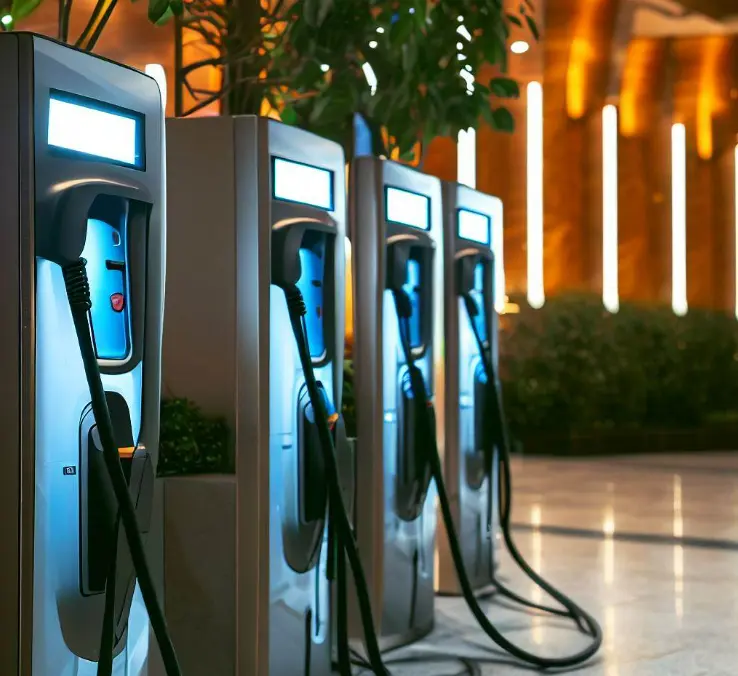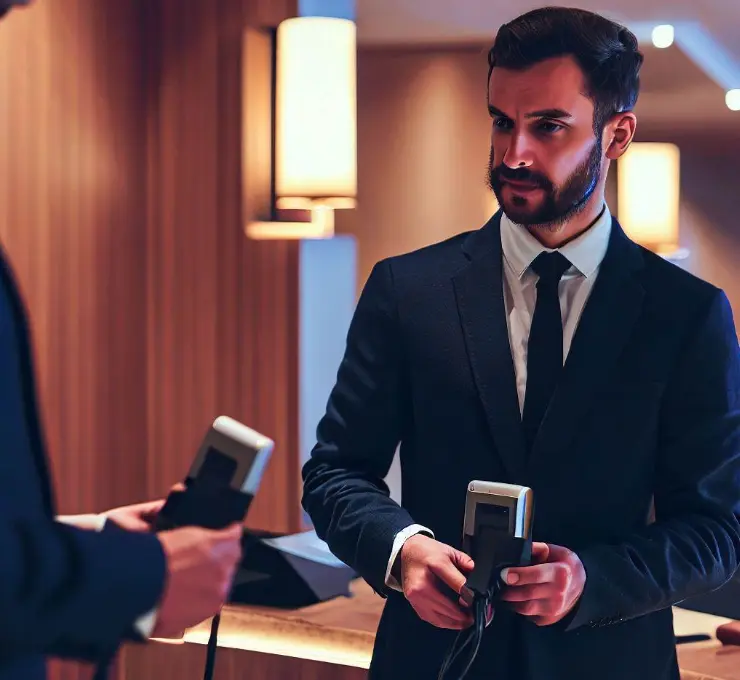Electric vehicle (EV) adoption is rapidly increasing, with more drivers opting for emission-free transportation. This rise in EVs on the road presents an excellent opportunity for hotels to meet guest demands while profiting from EV charging stations. Installing charging stations allows hotels to attract eco-conscious travelers, earn revenue through charging fees, reduce operating costs, and support sustainability initiatives.
 Hotels can utilize various pricing models to generate profits from EV charging stations. The pay-per-kWh model is the most common, allowing hotels to recoup installation and operating costs through usage fees. Hotels may also offer free charging to incentivize guests to stay longer and spend more money on rooms, food, and amenities. Sponsors and advertising can offset costs for free stations. Understanding charging station economics and choosing the right monetization approach is key to maximizing profits.
Hotels can utilize various pricing models to generate profits from EV charging stations. The pay-per-kWh model is the most common, allowing hotels to recoup installation and operating costs through usage fees. Hotels may also offer free charging to incentivize guests to stay longer and spend more money on rooms, food, and amenities. Sponsors and advertising can offset costs for free stations. Understanding charging station economics and choosing the right monetization approach is key to maximizing profits.
Pay-Per-kWh Pricing Model
The pay-per-kWh pricing model is the most straightforward way for hotels to earn direct revenue from EV charging stations. With this model, drivers pay a fee based on the number of kilowatt-hours dispensed during each charging session. Hotels set their own rates per kWh, typically ranging from $0.30 to $0.50.
Usage fees apply regardless of whether a driver is a hotel guest or not. This allows hotels to profit from EV drivers passing through the area looking for a quick charge. Pay-per-kWh pricing effectively offsets both upfront installation costs and ongoing utility and maintenance expenses. Hotels can tune their rates to achieve profitability goals after analyzing local electricity prices and charging station utilization.
Pay-per-kWh pricing offers flexibility to hotels and EV drivers alike. Hotels can adjust rates as needed to cover costs and maximize profits. EV drivers only pay for the energy they use, avoiding unnecessary fees. The pay-per-kWh model works well for hotels in prime locations expecting high charging demand.
Complimentary Charging for Hotel Guests
Offering free charging is an effective way for hotels to attract and retain EV driving guests. While complimentary charging does not directly produce revenue, the indirect benefits often make up for it. EV drivers are likely to select hotels with free charging over those that charge usage fees. Providing charging at no cost caters to guest demands while encouraging longer stays, larger food and beverage bills, and repeat visits.
Complimentary charging for overnight guests can be an especially big draw. Range anxiety diminishes when drivers know they can recharge before continuing their trip. Hotels with ample charging capacity allow EV road trippers to take advantage of the opportunity.
 The costs of providing free charging for overnight guests paying for rooms will generally be low. Load management software can schedule charging sessions during off-peak hours to minimize demand charges. EV charging overnight also matches well with hotel energy demand patterns. Any revenue lost from usage fees is usually offset by increased spending and loyalty from EV driving guests.
The costs of providing free charging for overnight guests paying for rooms will generally be low. Load management software can schedule charging sessions during off-peak hours to minimize demand charges. EV charging overnight also matches well with hotel energy demand patterns. Any revenue lost from usage fees is usually offset by increased spending and loyalty from EV driving guests.
Sponsorships and Advertising Revenue
Hotels can creatively leverage charging stations to earn revenue through sponsorships and advertising. EV charging stations provide prime advertising real estate – a literally captive audience of EV drivers waiting for their vehicles to charge. Branded charging station wraps, video ads playing on station screens, and special offers delivered through charging networks are just some of the potential opportunities.
Sponsorship agreements present another means to offset charging station costs. Hotels can partner with EV manufacturers, charging networks, tourism boards, and other businesses to co-brand stations in exchange for upfront and ongoing financial support. The hotel provides the real estate and handles maintenance while the sponsor supplies the hardware, software, and connectivity. Revenue sharing agreements on usage fees provide long-term income streams for the hotel.
Grants and Incentives
State and utility grants and incentives can significantly reduce the upfront costs of installing EV charging stations. Hotels should research available programs which often reimburse 50-80% of hardware, construction, and wiring expenses. Some utilities offer rebates on make-ready infrastructure upgrades or reduced demand charges. Ongoing incentives may also apply based on kilowatt-hours dispensed.
Taking advantage of grants and incentives enables hotels to deploy more charging stations while slashing payback periods. The savings support additional investments in chargers, facilities, and other amenities to better serve EV guests. In some cases grants coupled with sponsorships can effectively provide hotels with fully funded charging stations.
Lower Operating Costs
EV charging stations allow hotels to reduce transportation expenses associated with hotel-provided vehicles. Hotels that offer shuttle services for local trips or airport transfers can transition these vehicles to EVs. Charging the EVs overnight using the stations keeps fuel costs minimal.
Replacing conventional fleet vehicles with EVs also provides branding and marketing opportunities. Guests increasingly expect sustainable practices and appreciate steps hotels take to reduce emissions. Promoting the use of EVs shows leadership in environmental stewardship.
Owning the charging infrastructure also protects hotels from volatile gas prices. While electricity rates may fluctuate, they have historically been more stable than gasoline. Investing in charging stations future-proofs hotels against rising fuel costs.
Increased Revenue from Food & Beverage
EV drivers stopping for a quick charge present an excellent opportunity for hotels to drive food and beverage revenue. Adding a café near charging stations gives drivers a convenient spot to grab a coffee, snack or meal while they wait. Hotels can form partnerships with on-site restaurants to deliver special discounts on dining and drinks to customers charging their EVs.
 Creative promotions encourage drivers to spend more time and money at hotels while their vehicles charge. Tesla owners staying at select Starwood hotels receive free breakfast vouchers for charging their EVs, for example. Other hotels offer dining credits, lounge access, or discounted room rates when combined with a charging session.
Creative promotions encourage drivers to spend more time and money at hotels while their vehicles charge. Tesla owners staying at select Starwood hotels receive free breakfast vouchers for charging their EVs, for example. Other hotels offer dining credits, lounge access, or discounted room rates when combined with a charging session.
Enhanced Guest Experience & Loyalty
Providing EV charging improves guest experience and loyalty. EV drivers no longer need to hunt down third-party charging stations when traveling. Hotel-owned charging guarantees reliable, convenient recharging on-site for guests. Surveys show 80% of EV drivers are more likely to frequent hotels with charging capabilities.
Easy recharging reduces range anxiety and makes road trip planning simpler. Guests can explore more regional attractions knowing they can recharge at their hotel each night. This gives hotels opportunities to recommend local sites and activities. Reliable charging also minimizes disruptions to itineraries and scheduled events.
Owning the driver relationship through an in-house charging network allows hotels to learn more about guest behaviors and needs. Hotels can use charging data and feedback to refine amenities and services to exceed EV traveler expectations. These insights build loyalty and brand affinity with an increasingly influential guest demographic.
In summary, hotels can utilize EV charging stations to enhance the guest experience while opening up multiple revenue streams. The right pricing model, approach to cost recovery, and ancillary offerings allow hotels to profit from charging stations. EV drivers also tend to spend more and reward hotels that address their recharging needs. As EVs continue to gain market share, hotels that cater to their charging requirements position themselves for sustainable success.
